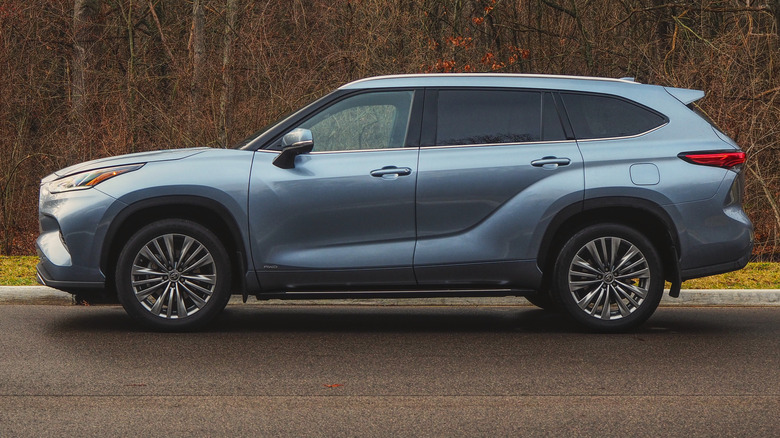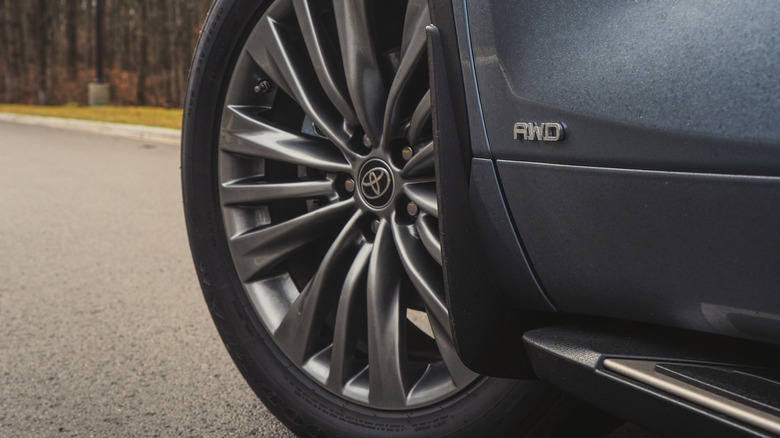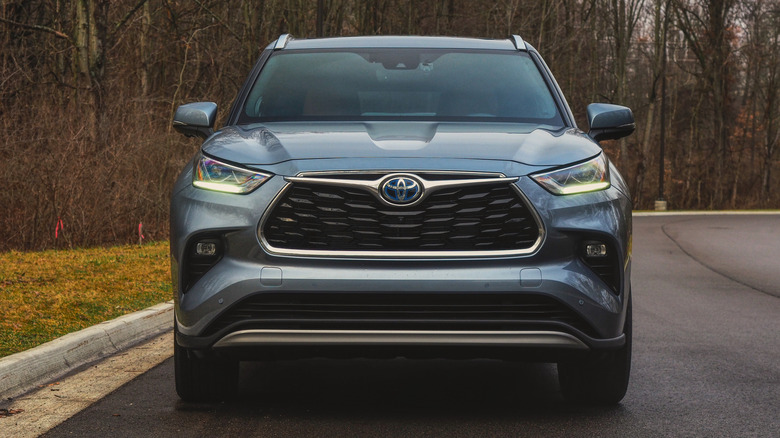The 2023 Toyota Highlander Hybrid Has Excellent Fuel Economy For A 7-Seater SUV
While the shift to electric cars may be underway, not everyone is quite ready to say goodbye to gasoline. If you don't have anywhere to charge an EV or want the reassurance of being able to refuel at your local gas station, an electrified option like the 2023 Toyota Highlander Hybrid could be a good alternative. While many of the advantages of a full EV don't apply, that's not to say there's no reason to spend a little extra beyond the standard, gas-only Highlander.
The 2023 Highlander Hybrid isn't exactly fancy with its electrification. It's not a plug-in hybrid (PHEV), supporting external charging for the flexibility of dual fuel sources. It has an EV mode, but it'll only work for short distances and at low speeds: you won't be able to drive from home to the grocery store and back on electric power alone like you would with most PHEVs.
Instead — much like the Prius before it — the Highlander Hybrid uses mild-hybridization for what that technology is best known for: improving fuel economy. By reclaiming power which would otherwise be wasted when slowing, or when the engine is idling, and storing it in a small battery, the electrified Highlander can then contribute that when drive propulsion is needed. It's all automatic and requires no change in how you drive the SUV, but the benefits are clear.
Surprising economy for a three-row SUV
Three-row family SUVs aren't, for the most part, known for their frugality. After all, transporting seven or eight people, plus their luggage, means a decent-sized engine is required. Drivers may not be expecting sports car performance, but they're not willing to put up with an anemic powertrain either.
On that front, the Highlander Hybrid could offer the best of both worlds. You still get 243 horsepower and a choice of front-wheel drive or all-wheel drive, but with an EPA economy rating of 35 mpg in the city, 35 mpg on the highway, and 35 mpg combined. With a reasonable right foot and mixed driving conditions, we hit 29 mpg with no issue in our own testing of the Toyota.
They're genuinely impressive numbers. The non-hybrid Highlander is rated for 21 mpg in the city, 28 mpg on the highway, and 24 mpg combined. Key competitors, like the Hyundai Palisade and Kia Telluride, are both rated for 21 mpg combined when in AWD form. Ford's Explorer Hybrid does a little better, but its 25 mpg combined rating is still well behind what the Toyota can achieve.
Huge distance between gas station stops
The result is a huge range from a full gas tank — almost 600 miles — without having to think about finding the nearest electric car charger. According to the EPA, the Highlander Hybrid will save $1,500 in fuel costs over five years, compared to the average new vehicle; its Hyundai and Kia counterparts will cost $3,000 more by the same measure.
The Environmental Protection Agency bases those amounts on driving 15,000 miles each year, with 45% of that driving done on the highway and 55% in the city. It also assumes current gas prices. However, you can customize those numbers to recalculate based on your own specific circumstances.
Of course, for the math to work out, you'll also need to take into account the extra upfront cost of the hybrid. Depending on Highlander trim, that works out to between $1,000 and $1,500. In short, if you drive that 15,000 miles annually which the EPA takes as a baseline, the cost of the hybrid drivetrain could be covered in the space of twelve months in gas savings alone.


